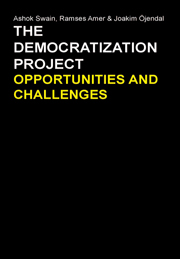Book contents
- Frontmatter
- Contents
- List of Tables
- List of Figures
- Acknowledgements
- Contributors
- The Democratization Project: Opportunities and Challenges
- 1 The Democratization Project: Peace, Conflict and Development
- 2 Non-Authorized Military Interventions and Legitimization by the United Nations
- 3 From Condemnation to Legitimization of Outcome: The United Nations and the Use of Force in Inter-State Relations
- 4 Demos or Deus: Patterns of Religious Dimensions in Asian Armed Conflicts, 1945–2005
- 5 The Left and Democratic Consolidation – Deepening Democracy in Latin America?
- 6 Democracy without People? – The Risk of Monopolizing the Democratization Project
- 7 The Role of Hamas in Building Palestinian Democracy in the Midst of Violence
- 8 Elections and Violence in Sri Lanka: Understanding Variation Across Three Parliamentary Elections
- 9 Post-Accord Elections and Armed Conflict
- 10 Peace Through Democracy? The Challenges of Postwar Democratization in Weak and War-Torn States
2 - Non-Authorized Military Interventions and Legitimization by the United Nations
Published online by Cambridge University Press: 05 March 2012
- Frontmatter
- Contents
- List of Tables
- List of Figures
- Acknowledgements
- Contributors
- The Democratization Project: Opportunities and Challenges
- 1 The Democratization Project: Peace, Conflict and Development
- 2 Non-Authorized Military Interventions and Legitimization by the United Nations
- 3 From Condemnation to Legitimization of Outcome: The United Nations and the Use of Force in Inter-State Relations
- 4 Demos or Deus: Patterns of Religious Dimensions in Asian Armed Conflicts, 1945–2005
- 5 The Left and Democratic Consolidation – Deepening Democracy in Latin America?
- 6 Democracy without People? – The Risk of Monopolizing the Democratization Project
- 7 The Role of Hamas in Building Palestinian Democracy in the Midst of Violence
- 8 Elections and Violence in Sri Lanka: Understanding Variation Across Three Parliamentary Elections
- 9 Post-Accord Elections and Armed Conflict
- 10 Peace Through Democracy? The Challenges of Postwar Democratization in Weak and War-Torn States
Summary
Purpose and Structure
The main aim of this study is to asses the challenges faced by the United Nations in its involvement in countries targeted by foreign military interventions that have not been authorized by the Security Council of the United Nations. The focus is on the United Nations' response to the outcome of the military interventions at two main levels. First, at the level of the Security Council and the decisions taken there on the nature and scope of the involvement of the United Nations in the post-intervention developments in the target state. Second, at the level of the target state, the focus is on the challenges that the United Nations may face in carrying out a given mission.
The structure of the study is as follows. First, the phenomenon of nonauthorized military intervention is defined and cases are selected. Second, the United Nations' responses to the selected cases are outlined. Third, the impact of the United Nations' response on its legitimacy is assessed.
Defining Non-Authorized Military Intervention and Selecting Cases
Non-authorized military interventions
The definition of a non-authorized military intervention to be used in the context of this study is the use of force by one or more states against the territorial integrity of a state against the will of that state, without prior authorization of the Security Council of the United Nations.
- Type
- Chapter
- Information
- The Democratization ProjectOpportunities and Challenges, pp. 17 - 38Publisher: Anthem PressPrint publication year: 2009

